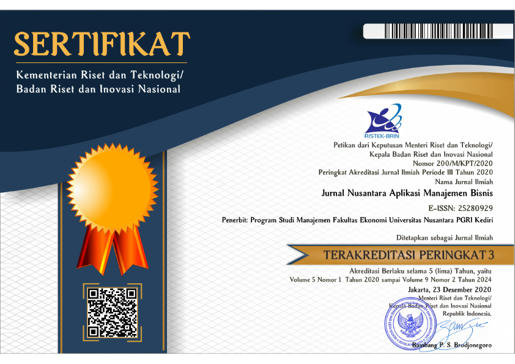Green Knowledge Sharing for Sustainable Competitive Advantage in The Halal Industry Through an HRM Perspective
DOI:
https://doi.org/10.29407/nusamba.v10i1.22220Keywords:
Halal Industry, Green Knowledge Sharing, Green HRM, sustainable competitive advantageAbstract
Research aim: This research aims to explore the role of Green Human Resource Management (GHRM), Green Knowledge Sharing (GKS), green leadership, and employee green behavior in achieving sustainable competitive advantage (SCA) in the halal industry, using the Resource-Based View (RBV) perspective.
Method: This study uses a systematic literature review (SLR) to analyze the relationship between GHRM, GKS, green leadership, and employee green behavior towards SCA. Data were collected through a thorough search in Scopus and Google Scholar databases with related keywords.
Research Findings: Findings show that GHRM, GKS, and green leadership play important roles in improving SCA. GHRM and GKS strengthen employee green behavior, which supports the organization's environmental performance. Green leadership improves the implementation of GHRM and GKS and strengthens the relationship between GHRM and employee green behavior. Employee green behavior also acts as a mediator between GHRM and SCA.
Theoretical Contribution: This research expands the understanding of how green HRM practices and knowledge sharing contribute to sustainable competitive advantage, especially in the halal industry, which must comply with Sharia principles and global environmental standards.
Practical Implications: These findings provide practical guidance for the halal industry in Indonesia to integrate GHRM and GKS with Sharia principles and implement green leadership to achieve sustainable competitive advantage in the global market.
Research Limitations: This research is limited to the literature available in the database and may not cover all practical and theoretical aspects of GHRM and GKS in the halal industry.
Downloads
References
[1] RISSC. The Muslim 500: The World’s 500 Most Influential Muslims. R Islam Strateg Stud Cent 2023.
[2] DinarStandard. State of the Global Islamic Economy Report 2020/2021. 2021.
[3] Adner R, Zemsky P. A demand‐based perspective on sustainable competitive advantage. Strateg Manag J 2006. https://doi.org/10.1002/smj.513.
[4] Abd-Mutalib H. The determinants of environmental knowledge sharing behaviour among accounting educators: a modified theory of planned behaviour. Int J Sustain High Educ 2023;24:1105–35. https://doi.org/10.1108/IJSHE-02-2022-0053.
[5] Ahmad F, Hossain MB, Mustafa K, Ejaz F, Khawaja KF, Dunay A. Green HRM Practices and Knowledge Sharing Improve Environmental Performance by Raising Employee Commitment to the Environment. Sustainability 2023.
[6] Almada L, Borges R. Sustainable competitive advantage needs green human resource practices: A framework for environmental management. Rev Adm Contemp 2018.
[7] Bandaranayake IWM, Pushpakumari MD. How to Measure Sustainable Competitive Advantage a Literature Review. ir.lib.ruh.ac.lk; 2021.
[8] Ngo OTL, Ngo TQ. Sustainable development in Vietnamese exporters: assessing the influence of green innovation, corporate social responsibility, and green hrm: the role of green commitment and green knowledge sharing. Int J Econ Financ Stud 2023;15:106–30.
[9] Widodo. The model of human capital and knowledge sharing towards sustainable competitive advantages. Probl Perspect Manag 2015;13:124–34.
[10] Garcia-Perez A. Knowledge Sharing as a Driver of Competitive Advantage: Two Cases from the Field. Knowl Manag Organ Learn 2018;6:145–67. https://doi.org/10.1007/978-3-319-66890-1_8.
[11] Kazlauskaitė R, Bučiūnienė I. The role of human resources and their management in the establishment of sustainable competitive advantage. Inžinerinė Ekon 2008.
[12] Lin Y. Determinants of green competitive advantage: the roles of green knowledge sharing, green dynamic capabilities, and green service innovation. Qual Quant 2017;51:1663–85. https://doi.org/10.1007/s11135-016-0358-6.
[13] Kusuma NT. The Influence of Green Knowledge Sharing and Green Organizational Commitment on Green Competitive Advantage: The Mediating Role of Green Innovation. Lect Notes Networks Syst 2023;620:106–17. https://doi.org/10.1007/978-3-031-26953-0_12.
[14] Kadhim SJ, Rahman SJ. The impact of sustainable practices of green knowledge sharing on competitive capabilities: Applied study for a sample of MasterCard workers in Iraq. Al-Qadisiyah J Adm Econ Sci 2023;25:131–9.
[15] Zairbani A, Kumar JS. How Does Green Knowledge Sharing Improve Sustainable Business Performance and Sustainable Competitive Advantage? The Role of Organizational Green Culture and Green Innovation in SMEs. Role Organ Green Cult Green Innov SMEs 2023.
[16] Armstrong M, Taylor S. Armstrong’s Handbook of Human Resources Management Practice, 15th Edition. 2020.
[17] Renwick D, Redman T, Maguire S. Green HRM: A review, process model, and research agenda. Univ Sheff … 2008.
[18] Abbariki M, Abd-Mutalib H, Adams GL, Lamont BT, Adner R, Zemsky P, et al. Competitive advantage and automated sharing of tacit knowledge. Sustainability 2023;74:221–31. https://doi.org/10.1007/978-3-031-26953-0_12.
[19] Porter ME. Competitive strategy. New York 1982.
[20] Barney JB. Types of competition and the theory of strategy: Toward an integrative framework. Acad Manag Rev 1986;11:791–800.
[21] Barney JB. Firm resources and sustained competitive advantage. Econ. meets Sociol. Strateg. Manag., vol. 17, Emerald Group Publishing Limited; 2000, p. 203–27.
[22] Marcus A, Shrivastava P, Sharma S, Pogutz S. Cross-sector leadership for the green economy: Integrating research and practice on sustainable enterprise. books.google.com; 2016.
[23] Becerra-Fernandez I, Sabherwal R. Knowledge management: Systems and processes. Routledge; 2014.
[24] Zhang Q, Ma Y. … impact of environmental management on firm economic performance: The mediating effect of green innovation and the moderating effect of environmental leadership. J Clean Prod 2021.
[25] Sarkar A. Green Marketing and Sustainable Development-Challenges and Opportunities. Int J Mark Financ Serv Manag Res 2012.
[26] Wang N, Wu G. A Systematic Approach to Effective Conflict Management for Program. SAGE Open 2020;10:2158244019899055.
[27] Zhang YYY, Zhang L, Liu G, Duan J, Xu S, Cheung MW-L, et al. The joint impact of green human resource management, leadership and organizational culture on employees’ green behaviour and organisational environmental performance. Sustainability 2023;11:128112. https://doi.org/10.1007/s11356-021-16707-z.
[28] Wang Z. Linking innovative knowledge sharing and employees’ innovative behaviour: the mediating role of thriving at work. Knowl Manag Res Pract 2023:1–11.
[29] Marczewska M, Jaskanis A, Kostrzewski M. Knowledge, competences and competitive advantage of the green-technology companies in Poland. Sustainability 2020.
[30] Moher D, Liberati A, Tetzlaff J, Altman DG, Group P. Preferred reporting items for systematic reviews and meta-analyses: the PRISMA statement. Int J Surg 2010;8:336–41.
[31] Harari MB, Parola HR, Hartwell CJ, Riegelman A. Literature searches in systematic reviews and meta-analyses: A review, evaluation, and recommendations. J Vocat Behav 2020;118:103377.
[32] Ibrahim E. The Sharing of Knowledge to Gain a Competitive Advantage by Small Businesses in Africa: Some critical comments. Dig Middle East Stud 2003;12:26–40. https://doi.org/10.1111/j.1949-3606.2003.tb00479.x.
[33] Glisby M. Mastering tacit corridors for competitive advantage: Cross-cultural knowledge creation and sharing at four international firms. Glob Bus Organ Excell 2011;30:64–77. https://doi.org/10.1002/joe.20396.
[34] Hatch NW, Dyer JH. Human capital and learning as a source of sustainable competitive advantage. Strateg Manag J 2004. https://doi.org/10.1002/smj.421.
[35] Rauf FHA. Achieving competitive advantage through knowledge sharing: Deducing the determinants of knowledge sharing towards a new concentric model: A review. Int J Knowl Manag Stud 2016;7:1–17. https://doi.org/10.1504/IJKMS.2016.080220.
[36] Eidizadeh R. Analysing the role of business intelligence, knowledge sharing and organisational innovation on gaining competitive advantage. J Work Learn 2017;29:250–67. https://doi.org/10.1108/JWL-07-2016-0070.
[37] Azeem M. Expanding competitive advantage through organizational culture, knowledge sharing and organizational innovation. Technol Soc 2021;66. https://doi.org/10.1016/j.techsoc.2021.101635.
[38] Wening N. The Mediating Role of Creativity on The Effect of Knowledge Sharing on Sustainable Competitive Advantage. ABAC J 2023;43:42–61. https://doi.org/10.14456/abacj.2023.14.
[39] Mustafa K, Hossain MB, Ahmad F, Ejaz F, Khan HGA, Dunay A. Green human resource management practices to accomplish green competitive advantage: A moderated mediation model. Heliyon 2023.
[40] Ahmad S, Islam T, Sadiq M, Kaleem A. Promoting green behavior through ethical leadership: a model of green human resource management and environmental knowledge. Leadersh Organ … 2021. https://doi.org/10.1108/LODJ-01-2020-0024.
[41] Khan K, Shams MS, Khan Q, Akbar S, ... Relationship among green human resource management, green knowledge sharing, green commitment, and green behavior: A moderated mediation model. Front … 2022. https://doi.org/10.3389/fpsyg.2022.924492.
[42] Malik MS, Ali K, Amir M, Tariq K, Ramzan M. Green transformational leadership, environmental strategy, and green innovation: Mediated moderation of knowledge sharing and green absorptive capacity. Pakistan J Commer Soc Sci 2024;18:503–26.
[43] Muisyo PK, Qin S, Ho TH, Julius MM. The effect of green HRM practices on green competitive advantage of manufacturing firms. J Manuf … 2022. https://doi.org/10.1108/JMTM-10-2020-0388.
[44] Khan RU, Saqib A, Abbasi MA, Mikhaylov A, ... Green Leadership, environmental knowledge Sharing, and sustainable performance in manufacturing Industry: Application from upper echelon theory. … Energy Technol … 2023.
Downloads
Published
Issue
Section
License
Copyright (c) 2025 Taufiq Rahmat, Eeng Ahman

This work is licensed under a Creative Commons Attribution-ShareAlike 4.0 International License.
Authors who publish with this journal agree to the following terms:
- Copyright on any article is retained by the author(s).
- The author grants the journal, the right of first publication with the work simultaneously licensed under a Creative Commons Attribution License that allows others to share the work with an acknowledgment of the work’s authorship and initial publication in this journal.
- Authors are able to enter into separate, additional contractual arrangements for the non-exclusive distribution of the journal’s published version of the work (e.g., post it to an institutional repository or publish it in a book), with an acknowledgment of its initial publication in this journal.
- Authors are permitted and encouraged to post their work online (e.g., in institutional repositories or on their website) prior to and during the submission process, as it can lead to productive exchanges, as well as earlier and greater citation of published work.
- The article and any associated published material is distributed under the Creative Commons Attribution-ShareAlike 4.0 International License












